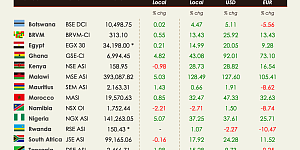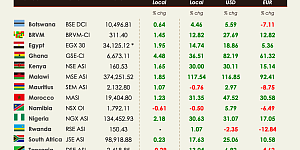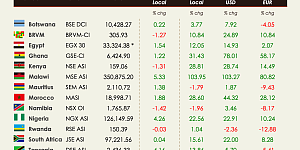There is something new under the sun… The UK vote to leave the European Union which, despite being a potential consequence of the referendum just as much as the Bremain, literally spread chaos through global markets on Friday. Slowing demand from China, flat commodity prices and now a Brexit, what’s in it for African markets?
Already weakened South Africa may be the most affected by the Brexit. The rand became the second worst performing currency after the British pound on Friday, falling by almost 7%. A lot of South African firms are dual-listed in London and Johannesburg and thus inevitably suffered just as much as their peers on the LSE. It is no secret that South Africa has close financial ties to the UK. On top of that, the UK is the fourth largest exports destination for South Africa and investors fear that trade between the two countries may be hurt. This happens in a context where South Africa’s GDP contracted 1.2% in the first quarter of the year. JSE ASI slightly decreased by 0.88%.
Concerning Nigeria, the Brexit just happens at the wrong moment. The government just put policies in place to avoid a recession like removing strict currency controls and liberalising oil prices. Trade between the two countries, valued at around $8.3bn is likely to be disrupted for a moment. UK was the largest source of foreign investment for Nigeria in 2015, if taking the assumption that the Brexit will involve a slowdown in the British economy and that the resulting reduced trade and investment from Britain will not be covered by the rest of the EU, this could adverse effects for Nigeria. The newly liberalised FX market may prove counter-productive in this context. NGSE ASI climbed 4.79%.
Kenya, just like its African peers, risks falling exports, local currency pressure and capital outflows from risk adverse investors but of course there are few absolutes everywhere. UK is one of the country’s top exports destination, exports of Kenyan flowers could fall. The country’s central bank stated it has 560 bn Kenyan shillings of foreign reserves which is enough to cover five months of imports. NSE ASI fell by 3.7%.
EGX 30 performed poorly this week, falling 2.25% as the Central Bank of Egypt’s decided to raise key interest rates by 100 basis points and as potential loss of British investment worried investors in Egypt.
As we are entering uncharted territories, the exact knock-on impact of Brexit on Africa is difficult to gauge and one can only create as many scenarios. Although the news came as a shock to a lot, the exit of UK from the EU will probably involve a very long process and the accompanying uncertainty will likely hurt both the UK and the European economy. Truth is, the global economy was not doing very well in the first place, as such slower growth in developed economies may not feed extreme FX moves and volatility may or may not be lower going forward. The other side of the coins suggests that free-from-EU UK will be keen to improve its trade relationships with its Commonwealth partners, many of which are in Africa, providing these countries with key leverage. To benefit from this, investors will need to go through a certain period of uncertainty, but again African investors should know this by now.










































